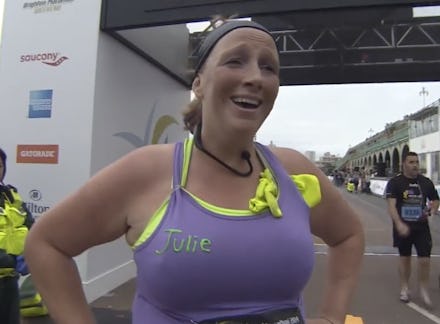This Young Runner's Response to Criticism of Her Weight Deserves a Standing Ovation

The stereotype of a marathoner generally leans toward someone who is lean bodied with sinewy limbs. Julie Creffield doesn't look like that. She's almost a UK size 16 and has struggled with her weight all through her 20s. But while some people tried to prevent Creffield from pursuing her passion, she proves over and over again that you don't have to be skinny to love running.
"The idea of there being just one type of runner is ludicrous — If you run … you are a runner SIMPLE!" Creffield writes on her blog, The Fat Girl's Guide To Running, which encourages plus-size women to run, and helps them train.
Creffield's advice has been hard-earned. An experienced runner, Creffield has completed multiple marathons, including the 2012 London Olympics marathon and the Brighton marathon.
But it wasn't always this way. When she was in her early twenties, running for more than 30 seconds was a painful struggle. When she was attempting to complete her first short race, she "almost died on the way round, and not only due to the unusual strain on my body, but also from pure embarrassment when a young boy shouted 'run fatty, run' as I passed him."
That was a huge turning point for Creffield, a native of East London. Since then, Creffield has worked hard to turn the cruel taunts of "fatty" into an empowering symbol of her perseverance. Weekly chats on her blog are called #AskFatty, her Twitter handle is @FattyMustRun and her website's "about" page describes her life story under the title, "Who is Fatty?"
"Many people simply think that running is something that FAT women can't or shouldn't do at all, including some medical professionals and I am on a mission to prove otherwise," she writes. "As long as you learn to listen to your body and build up slowly there is no reason that anybody of any size shouldn't enjoy the sport of running."
Society has long held a prejudice against those who dare excercise while overweight. Condescending encouragements are no better than fat-shaming insults, like the one in the viral letter to "Fatty On The Westview Track," in which a writer made unfounded assumptions about the lifestyle of the overweight runner he saw.
After years of training and proving herself as a runner, Creffield says she, too, has had to face naysayers and skeptics. In a recent op-ed written for The Huffington Post, Creffiled recalled a visit to one of her doctors. She had pulled a muscle, and the doctor told her that considering her weight, she should probably stay off the track.
"That doctor wrote me off with his Too-Fat-to-Run attitude, so I now run in a hoodie with those words as a slogan," she said. "However I included a big fat question mark to encourage other people big and small to challenge their perceptions of what we believe those around us are capable of."
More than one-third of U.S. adults (34.9%) are obese, and about 70% are overweight, according to the Center of Disease Control. Studies have shown that fat-shaming leads to psychological issues among people. Because being fat is seen as something that is under your control, fat-shaming tends to further isolate and depress people. People who feel discriminated against because of their weight are more likely to either become or stay obese.
Creffield's blog is about helping women overcome these situations with practical solutions. Clearly, no one should attempt a marathon without the proper training, but Creffield's blog offers steps towards maintaining a routine and building up stamina. Running can be a healthy outlet for men and women of all sizes, and Creffield said she's been empowered by other plus-size runners who have shared with similar stories of overcoming adversity and ignorance following the launch of her blog. "It kind of inspired me to run more, really, to show that you can," Creffield said, "showing that big girls can run too."